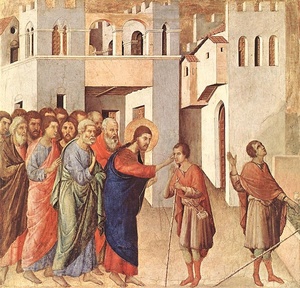The homilies and brief Angelus talks of the Pope really set the stage for what we ought to pay attention to in our spiritual life. His thinking is clear, and germane. Today is no different. How is it that we recognize and live within the authority of Jesus?
Jesus, on the Sabbath day, as he preached at the synagogue at Capernaum, the
small town where Peter and his brother Andrew lived on the lake of Galilee. In
his teaching, which arouses the wonder of the people, following the liberation
of “a man with an unclean spirit” (v. 23), who recognizes in Jesus as
the “saint of God,” that is, the Messiah. In a short time, his fame
spread throughout the region, which he travels announcing the Kingdom of God
and healing the sick of all kinds: word and deed. St. John Chrysostom observes
how the Lord “alternates the speech for the benefit of those who listen,
moving on from wonders to words and again passing from the teaching of his
doctrine to miracles” (Hom. on Matthew 25, 1: PG 57, 328).
The word that Jesus speaks to men immediately opens access to the will of the Father and the truth about themselves. It was not so, however, for the scribes, who struggled to interpret the Holy Scriptures with countless reflections. Furthermore, to the efficacy of the word, Jesus united the signs of deliverance from evil. St. Athanasius observes that “commanding and driving out demons is not human but divine work ‘, in fact, the Lord “distanced men from all diseases and infirmities. Who, seeing his power … still doubted that he was the Son, the Wisdom and Power of God? ” (Oratio de Incarnatione Verbi 18:19: PG 25, 128 BC.129 B). Divine authority is not a force of nature. It is the power of the love of God who created the Universe and, in becoming incarnate in His only begotten Son, in coming down to our humanity, heals the world corrupted by sin. Romano Guardini writes: “The whole life of Jesus is a translation of power in humility … Here is the sovereignty that lowers itself to the form of a servant” (Power, Brescia 1999, 141,142).
